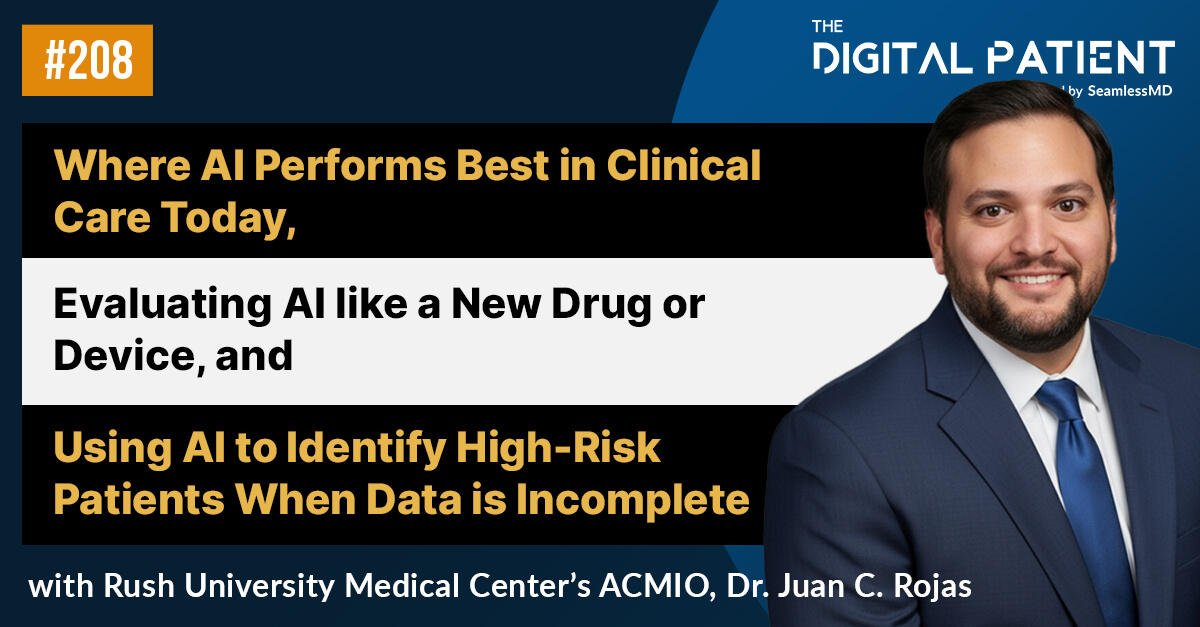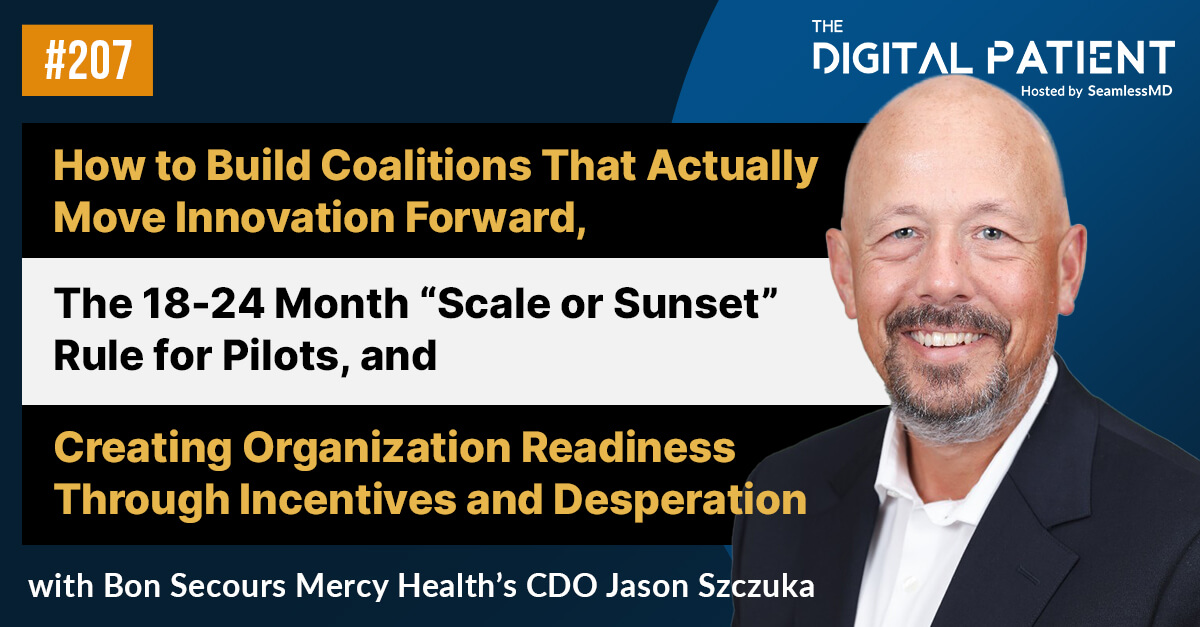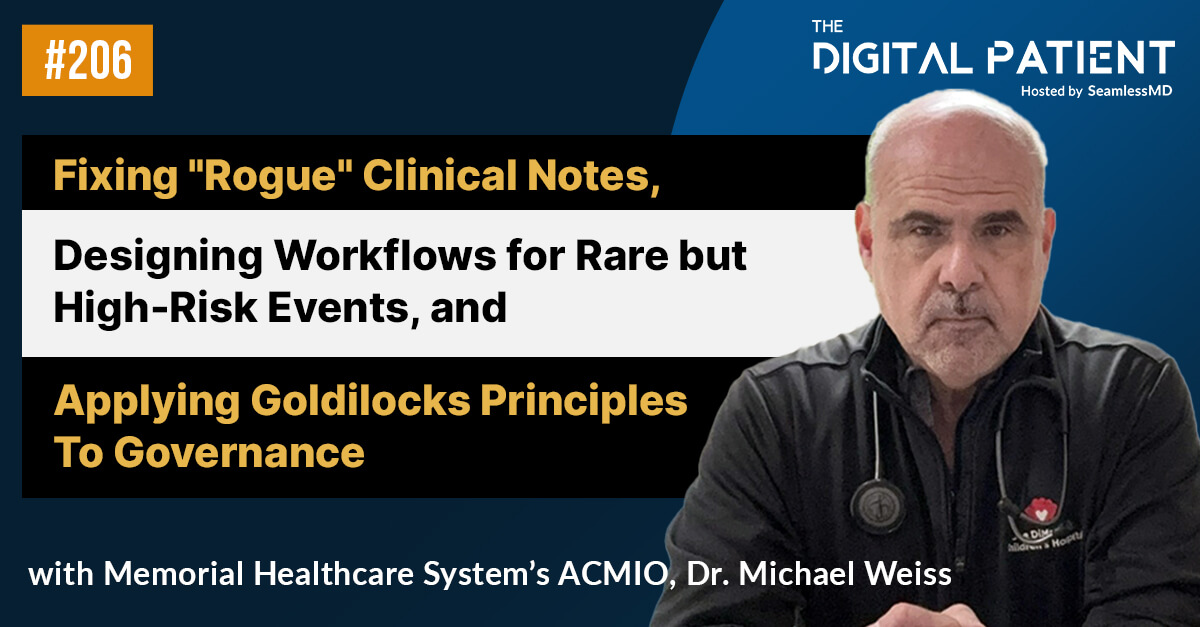Subscribe on: RSS | SPOTIFY | APPLE PODCAST | GOOGLE | BREAKER | ANCHOR
On this episode of "The Digital Patient" podcast, hosts Alan Sardana & Dr. Joshua Liu speak with Dr. Eric Makhni, Director, Quality and Informatics, Orthopedic Service Line at Henry Ford Health, about "How to implement Patient-Reported Outcomes (PROs) to be standard of care, How to make PROM collection easy and invisible, The value of building your network in healthcare, and more..." Click the play button to listen or read the show notes below.
Audio:
Video:
Guest(s):
- Dr. Eric Makhni (@EricMakhniMD), Director, Quality and Informatics at Henry Ford Health,
Team Physician for the Detroit Lions, and Co-founder at Protera Health - Dr. Joshua Liu (@joshuapliu), Co-founder & CEO at SeamlessMD
Episode 103 - Show Notes:
[00:01:25] How Dr. Makhni, whose parents were both physicians, developed an early interest in medicine while volunteering at his parents' medical practice as a child, and how after missing out on an opportunity to volunteer in the ER, he began working in the physical therapy ward, where he discovered his passion for orthopedics and sports medicine;
[00:03:53] Why Dr. Makhni decided to pursue an MBA concurrently with medical school to satisfy his interest in understanding the business of healthcare after seeing his parents struggle with the financial part of medicine;
[00:05:11] Why Dr. Makhni initially hesitated to put “MBA” on his papers due to the perception that being an MBA in medicine meant “you’re not clinically hardcore”, and how he overcame that perception;
[00:06:21] How getting his MBA helped Dr. Makhni see healthcare from a business perspective, which is crucial in aligning incentives and making care financially viable, and how being in an environment like MIT, where starting a company at a young age is the norm, helped him develop an entrepreneurial mindset and the willingness to take risks, which has been more impactful than his MBA in shaping his thinking;
[00:08:58] How unexpected opportunities can arise from networking, even from social media platforms like Twitter and LinkedIn, which is why Dr. Makhni emphasizes the value of reaching out to people and the potential benefits of helping others without expecting anything in return;
[00:10:02] How networking is not just about what one can get out of it, but also about giving back and helping others; Dr. Eric Makhni mentions that the more one helps, the more it comes back tenfold, and emphasizes the importance of this mentality in the professional world;
[00:12:04] How Dr. Makhni empathizes with vendors pitching their products, having now been in their position, and why he responds to almost every inbound pitch, even if he's not the right person, and tries to make a warm introduction if the pitch is compelling enough, as he believes hopes that his helpfulness will be karmically rewarded in the future;
[00:13:14] How Henry Ford Health empowered Dr. Makhni to become the Director of Quality & Informatics for the orthopedics service line through a natural evolution of him looking into patient report outcomes as a research tool, quality tool, and decision-making tool, eventually taking on more responsibility, which ultimately helped improve outcomes and quality;
[00:15:37] Why Dr. Makhni believes orthopedics has made more progress with PROs and PROMs than any other specialty because joint replacements are high-volume, reproducible surgeries, allowed the specialty to evolve quickly in understanding the importance of patient-driven metrics for pain and function;
[00:17:04] How orthopedics has made PROMs the cornerstone of research and how Dr. Makhni’s effort has been trying to take PROMs out of solely a research tool and into a clinical tool;
[00:17:36] Why Dr. Makhni believes for PROMs to become a part of care, incentives would have to change and EMRs would have to follow suit, and why Dr. Makhni believes CMS’s 2023 inpatient rule proposal for hip and knee replacements has laid the groundwork for this change;
[00:21:09] Why Dr. Makhni believes the process of collecting PROMs has to be invisible and fully integrated into clinical workflows in order to increase adoption and response rates;
[00:22:12] How Dr. Makhni and his team have introduced a PROM in the patient intake form to streamline the process and make it easier for the front desk, and how automating PROMs into documentation creates a useful clinical tool that is easy for clinicians to use and reference in their notes in real-time;
[00:25:33] How Dr. Makhni started Protera Health, a startup that aims to democratize the use of PROMs by making them easily accessible to those without sophisticated IT infrastructure with Epic, so they can use PROs to guide patients to appropriate and cost-effective care and prevent unnecessary surgeries;
[00:30:03] Why Dr. Makhni believes it is important to share findings and datasets with other health systems in different places as there is currently a lack of research on what is a normal score for different demographics;
[00:33:15] Why Dr. Makhni believes developing technologies without understanding the clinical workflow is a critical flaw for founders, and that successful startup founders can have shoddy MVPs that get to the patient part of it and address workflow;
[00:39:37] How Dr. Makhni would advise non-physician entrepreneurs or teams without clinical representation to have good justification on how you have identified a problem in healthcare first, before sharing the solution;
[00:40:13] Why Dr. Makhni advocates for healthcare startups to have clinicians on the team, either as subject matter experts, or leaders on your team as having individuals with relevant background and expertise will increase your credibility and likelihood of being taken seriously;
[00:43:23] Why Dr. Makhni is excited about digital tools and solutions that can help in managing the shift of risk from health plans to providers, and other digital solutions that can automate mundane tasks in healthcare such as call centers and scheduling, freeing up human resources for other important tasks;
[00:48:37] How Dr. Makhni gives back to the community by performing surgeries abroad, and why he believes that such experiences can ground physicians by teaching them how to do more with less and to provide better care to patients without being victimized by the pain as a vital sign approach practiced in developed countries, which puts a lot of pressure on healthcare providers to prescribe strong painkillers;
Fast 5 / Lightning Round:
- What is your favorite book or book you’ve gifted the most?
"The Obstacle Is the Way" by Ryan Holiday
- Who is a person–dead or alive–you’d love to meet?
"Abraham Lincoln"
- Would you rather have Super strength, super speed, or the ability to read people’s minds?
"Mind reading"
- What is something in healthcare you believe that others might find insane?
"Protocol care and predicting who will do well"
- If you could travel back in time to any event or moment, what would it be and why?
"The Revolutionary War period. Not to fight on the frontline, but to observe"
.svg)










.png)
